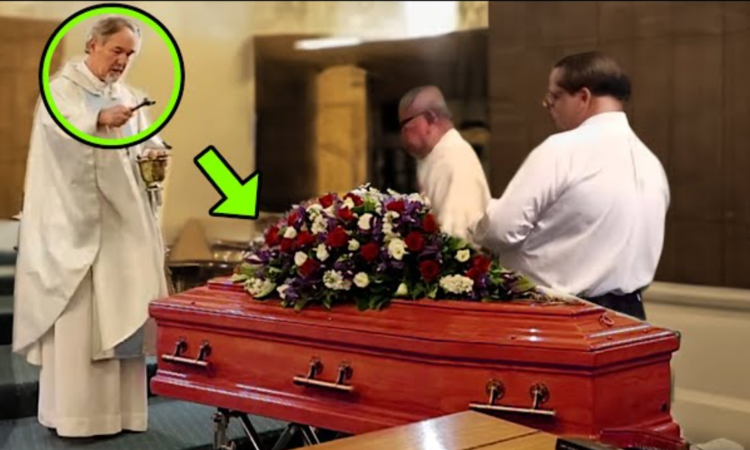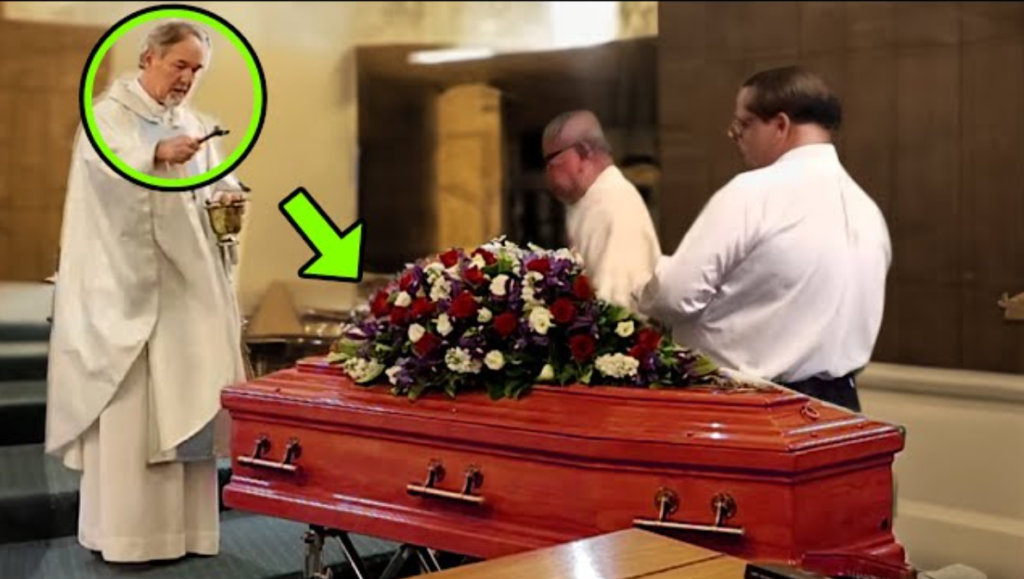During The Funeral, Bishop Sees Something STRANGE About The Dead Girl And Stops Everything!

The funeral took place under a sky shrouded in solemn gray. The procession meandered through the paths of St. Mary’s Cemetery while a drizzle fell, as if the heavens themselves were weeping. Erica’s funeral was a sad affair. The gathering was a somber blend of black umbrellas and hushed whispers, and moved like a slow tide towards her final resting place.

Bishop Andrew was a figure of gentle authority and compassionate wisdom. He led the procession, closely followed by Erica’s family members, their faces etched with grief. There was a peculiar air about them, a sense of mystery that seemed to cloak their sorrow. They were a tight-knit group, rarely seen in town and known for their reclusive nature. Whispers and rumors often swirled around them, but on this day, they were united in their despair.
In stark contrast to the grieving family, one figure stood slightly apart. He almost blended into the backdrop of aged tombstones. This mysterious stranger, a man in a nondescript coat, seemed to observe the proceedings with an intensity that bordered on unsettling. His presence was like a silent question mark, noticeable yet enigmatic.
The funeral procession reached the gravesite. The coffin, a polished casket adorned with white lilies, was positioned over the earth. Bishop Andrew stepped forward to deliver his final blessings. He had performed this ritual countless times, yet each occasion carried its own weight of sorrow and significance.
As the bishop began the liturgy, his voice was steady and comforting. But then something caught his eye. It was a fleeting moment, a brief second where the artificial lights from a nearby lamp post illuminated Erica’s face through the half-opened lid of the casket. What he saw made him falter mid-sentence. This was rare for a man of his experience. Something was amiss.
To the untrained eye, it would have seemed a trick of the light or a mere reflection of the sorrowful atmosphere. But Bishop Andrew had been observing the subtleties of human nature for years, and he saw a discrepancy that unsettled him. It was as if the girl in the coffin, whom everyone mourned as Erica, looked different. It was like a painting that had all the right strokes yet somehow failed to capture the essence of its subject.
The bishop’s heart quickened, a sense of unease creeping into his previously calm demeanor. He glanced around, wondering if anyone else had noticed the anomaly. But the mourners were lost in their grief, seemingly oblivious to the peculiar detail that now rattled around in the bishop’s thoughts.
Compelled by an gnawing curiosity, Bishop Andrew leaned closer under the pretense of offering a prayer. He needed to be sure. Too much doubt clouded his mind. As he whispered the words of the Holy Scripture, his eyes studied Erica’s features. The more he looked, the more certain he felt that something was wrong.
What troubled him most was not just the slight variance in her facial features, but a deeper, more unsettling notion. It was as if the girl lying in the coffin was mimicking Erica. She was an almost perfect replica, yet distinctly different in ways that were hard to articulate. The thought made him falter in his speech, and he was forced to stop the ceremony for a full minute.
The mourners were now looking at him in confusion, wondering what might have led such a weathered pastor to halt a funeral. Noticing their stares, the bishop straightened up. A storm of thoughts whirled in his mind. He had to tread carefully. This was neither the time nor the place for unfounded allegations or stirring panic.
With a practiced calm, he continued the service. But his eyes occasionally drifted to the mysterious stranger, who now seemed to watch him with a knowing gaze. As the ceremony drew to a close, Bishop Andrew knew that the mystery surrounding Erica’s death was far from resolved. Some questions needed answers, and he felt an unspoken obligation to seek them out.
The funeral ended with a final prayer, and as the mourners began to disperse, his resolve solidified. He needed a plan, and he needed it fast. His first step would be to revisit the funeral scene. So that night, he left the vicarage, rushed to the graveyard under the cloak of darkness, and stood by the now-sealed grave.
He replayed the events in his mind. The unease that had initially gripped him at the funeral transformed into a resolute determination to uncover the truth. The following day, Bishop Andrew began his inquiries. He visited Erica’s family first.
Their home was a secluded manor surrounded by overgrown gardens. The house felt as enigmatic as the family itself. They were still in mourning and received him with a mix of surprise and guarded courtesy. As he spoke with them, the bishop noted the inconsistencies in their stories about Erica.
Their recollections seemed rehearsed, their eyes often darting away when they spoke of her, as if they were hiding something. He learned that Erica was an artist, a young woman of profound talent and quiet disposition who rarely shared her work with others. They gave him a key and an address and sent him on his way.
On his trip downtown, Bishop Andrew discovered Erica’s secret studio. It was a room filled with vibrant paintings that revealed a life far more complex and mysterious than anyone knew. The artwork depicted far-off places and people unknown to her family and friends. It was as if Erica had been living a double life, one that was now captured only in her art.
Had her family members seen her artwork, he wondered? But they were too tight-lipped to reveal anything. The bishop then sought out Erica’s friends, most of whom were young artists and thinkers who knew her from the local art community. Their stories painted a picture of a young woman passionate about social justice.
They told him she was often involved in secretive projects that they knew little about. They spoke of her sudden, unexplained absences and her reluctance to discuss her personal life. Each piece of information added to the bishop’s growing suspicion that Erica’s death was not what it seemed.
The puzzle was complex, and with every piece he uncovered, the picture became more perplexing. It was during one of these visits to Erica’s acquaintances that the bishop encountered the mysterious stranger from the funeral. The stranger approached him in a quiet cafe. The man was calm yet intense.
“I know you’ve been looking for answers about Erica,” the stranger began, his voice low and steady. “What if I told you she’s still alive?”
This revelation hit Bishop Andrew like a bolt of lightning. The stranger explained that the funeral was a facade, a cover-up for something much more sinister. He claimed that Erica had discovered a dangerous secret about her family, and that put her life at risk.
According to the stranger, Erica had uncovered evidence of her family’s involvement in illicit activities. Fearing for her safety, she planned her own disappearance. The funeral was a way to convince the world, and more importantly her family, that she was no longer a threat.
The bishop listened intently. The stranger’s words resonated with the inconsistencies and mysteries he had already uncovered. The stranger, however, refused to reveal his identity or how he knew so much about Erica. But he insisted that the bishop stop his investigation for his own safety.
As the stranger left, Bishop Andrew sat in the dimly lit cafe, his mind racing. The pieces
of the puzzle were coming together, and the picture it formed was far more dangerous and complex than he had anticipated. Erica, it seemed, was not a victim of fate but a player in a game of deception and danger.
Now, more than ever, Bishop Andrew knew that he couldn’t let the matter rest. Erica’s life, and perhaps his own, depended on unraveling the web of secrets and lies that surrounded her. But with each step closer to the truth, the bishop realized he was venturing into a world far removed from the quiet solace of his church.
This was a world where the line between right and wrong was blurred by shadows and secrets. As night fell, Bishop Andrew returned to his modest quarters, his mind buzzing with theories and suspicions. In the quiet hours of the night, the bishop made a decision. He would continue his search for Erica and delve deeper into the mystery that surrounded her.
He realized that this journey would take him far beyond the realm of his usual pastoral duties, into a world of intrigue and danger. But for Erica, for the truth, he was willing to take the risk. As he delved deeper, the true extent of the plot began to unfold.
The bishop’s investigations led him to a hidden truth about Erica’s family. It revealed a labyrinth of illegal activities that were far more sinister than he could have imagined. Uncovering documents and covert communications, Bishop Andrew learned that Erica’s family was involved in an intricate network of illicit trading and political manipulation.
They had used their wealth and influence to orchestrate events to their advantage, often at the expense of others. Erica, with her keen sense of justice and moral integrity, had stumbled upon this dark secret. This was a revelation that put her in immediate danger.
Fearing for her life, Erica devised a plan to escape the clutches of her family’s malevolent reach. The third twist in the tale unfolded as Bishop Andrew discovered that Erica had orchestrated her own death. She had found a lookalike, a young woman who resembled her closely enough to deceive even those who knew her.
This woman, an actor struggling on the fringes of society, had agreed to play the part of Erica in death, lured by the promise of financial security. The staged funeral was a meticulously crafted performance designed to convince the world, and her family, that she was gone. The woman had been given sedatives to appear lifeless and was buried alive for a few hours.
She had been extracted from the casket after the funeral, and the falling rain had covered any sign of disturbance in the ground. In the shadows, Erica had slipped away, adopting a new identity and vanishing into obscurity.
Bishop Andrew grappled with the implications of this revelation. He had admired Erica’s art and the glimpse it offered into her vibrant soul. Now he understood the depth of her bravery and the desperation that had driven her to such lengths. His heart ached for the young woman who had been forced to abandon her life to protect herself.
The bishop found himself at a crossroads, his moral compass spinning wildly amid this complex web of lies and deceit. He was torn between his duty to the law and his empathy for Erica’s plight. Reporting the truth to the authorities would undoubtedly bring Erica’s family to justice, but it could also endanger Erica if her survival became known.
He was haunted by the weight of his decision. Bishop Andrew sought solace in the quiet of his church. Amidst the flickering candles and ancient pews, he prayed for guidance. He knew that whatever choice he made would have lasting consequences, not just for himself but for Erica and her family.
As he meditated on his dilemma, a sense of clarity began to emerge. He realized that Erica had chosen freedom over fear, courage over conformity. She had taken control of her destiny in the only way she could, and in doing so, she had freed herself from the oppressive shadow of her family.
With a heavy heart, Bishop Andrew decided to respect Erica’s decision. He would keep her secret and allow her the chance at a new life, free from the dangers of her past. Deep down, the bishop understood that sometimes the greater good required difficult choices, and that these choices didn’t always align with the letter of the law.
He carefully destroyed the evidence he had collected and made sure that no trace of Erica’s true fate would be found. In doing so, he accepted the burden of this secret. Suddenly, he was a silent guardian of Erica’s new beginning.
The bishop also realized that he had a role to play in bringing some measure of justice to the situation. He discreetly gathered evidence of Erica’s family’s illegal activities. Over a few nights, he compiled it in a way that implicated them without revealing Erica’s survival.
Then, on a Friday night, he anonymously sent this evidence to the authorities, setting in motion the downfall of a corrupt dynasty. The revelation of the family’s crimes caused a stir in the community and beyond. As the news broke, the family’s empire began to crumble, their influence and power dissolved under the weight of legal scrutiny.
In the aftermath, Bishop Andrew returned to his pastoral duties. His heart was heavy, but at least his conscience was clear. He often thought of Erica, wondering where she was and how she was faring in her new life. He prayed for her safety and happiness, and hoped that she had found peace away from the shadows that had once threatened to consume her.
At the same time, in a small, nondescript town miles away from the shadow of her past, Erica began her new life. After sending a trusted friend to make sure her fake funeral went smoothly, she had assumed a new identity that allowed her to blend into the anonymity of everyday life.
Here, she was no longer the heiress to a tainted legacy, but an ordinary individual with a chance at a fresh start. Erica found solace in simplicity. She worked at a local bookstore, an quaint establishment that smelled of old paper and coffee.
Her days were filled with the quiet joy of mundane tasks: cataloging books, recommending stories to customers, and occasionally getting lost in the pages of a novel during her breaks. In this new world, Erica discovered a sense of peace that had eluded her for so long.
She enjoyed walks in the park, the laughter of children playing, and the serene solitude of her modest apartment. The freedom to live without fear, without the burden of her family’s secrets, was a balm to her soul. Sometimes, she would paint, her brushstrokes capturing the tranquility of her new life.
Her art had transformed, no longer a reflection of turmoil and shadow, but of hope and light. Back in the town she had left behind, Bishop Andrew continued his pastoral duties. He carried with him the silent weight of what he knew. The empty coffin in Erica’s grave was a poignant symbol of the sacrifice she had made for her freedom.
He often stood before her grave, gazing at the headstone. It was a marker for a life that continued beyond its inscription. As he stood there in the twilight, the bishop reflected on the nature of secrets and sacrifices. He pondered the countless stories buried beneath the earth, each grave a keeper of untold tales.
He thought of Erica, her courage and her pain, and of the many others who carried hidden burdens. Deep down, he knew that sometimes, the truth was better left buried, and that some secrets were meant to be kept.




